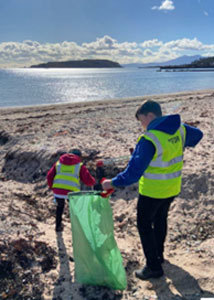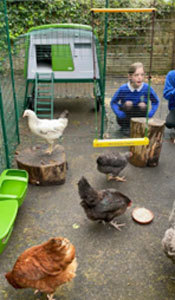Partnership working and sustainability in Cumbrae Primary School
Cumbrae Primary School is a small rural school in the village of Millport, on the Isle of Cumbrae in North Ayrshire. The current role of the school is 40 children across 3 classes. Eleven children attend the nursery. Over 60% of the children reside in Scottish Index of Multiple Deprivation (SIMD) decile 5 and the remainder in decile 2.
Staff use the local environment of beaches, woodlands, gardens and the local field studies centre effectively to enhance children’s learning experiences. This is helping the children to develop their understanding of sustainability and skills for life and work.
The improvement issue
Staff wanted to provide children with richer and more varied learning experiences that celebrate the unique context of the school and are not limited by the island setting. Staff wanted to design sustainable projects to help enhance children’s understanding of how to look after the island and the world they live in. They wanted children to explore and understand their role in making a positive difference in protecting the environment.
What Cumbrae Primary did
Staff were proactive in seeking partnerships with several groups to help the school on its sustainability journey. They designed a range of partnership projects that include gardening, outdoor learning, climate learning and food to fork projects:
- Staff worked with a wider range of partners to ensure that children have regular opportunities to participate in sporting, cultural and social events, which were not readily accessible in a remote community'
- Children are working in partnership with the local field study centre on a few outdoor learning and science projects. These projects have helped children to understand the wildlife and nature found on Cumbrae.
- ‘Warm Wednesdays’ were introduced, where a group of children have opportunities to play games and read with the older generation. This is helping children to appreciate and respect the older generation.
- A local ‘Handiwives’ group are teaching children in P6 to P7 classes to sew. These sewing skills are helping children to craft, upcycle clothing and make cushions.
- Staff are inviting a wider range of visitors to the school to help enhance children’s learning experiences. These visitors include authors, illustrators, lawyers, scientists and the local workforce.
- Children’s involvement in a carbon-neutral island project is helping them to learn how to upcycle clothes and reduce food waste.
- All children have regular high-quality outdoor learning, which is helping them to appreciate nature, understand their island landscape and learn how to look after their natural world.
- Staff have a long-term ambition for all children to leave primary school being able to cook 5 meals. Children are accessing regular well-planned opportunities to be involved in projects that grow food. They are learning about the demand and impact of the use of processed food, which has to be delivered to the island. Children have looked after chickens, gathered and cooked their eggs. The children also work all year to support a community café for the residents of Cumbrae.
What the sustained impact has been
Children are developing skills for learning, life and work and becoming responsible citizens.
Almost all children are engaged in learning activities and can explain how these are improving their life skills.
Questionnaires and discussions with children, partners and parents show the improvement in children’s wellbeing, improvement in positive relationships across generations, and an increase in children’s joy for learning.
Children have developed their knowledge of the wider workforce and have increased their ambition for future learning pathways.


